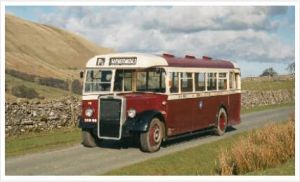Rosie the 1946 Leyland Tiger visited Carleton Clinic recently for Dementia Awareness Week and inspired my next couple of writing groups.
This lovely north country bus parked up outside the Ruskin Unit at Carleton Clinic as part of a Dementia Awareness Open Afternoon on Monday 18th May. I sat in the bus for an hour or so handing out old fashioned sweets, and talking to the patients who climbed aboard for a quick trip down memory lane, and to the carers and ward staff who accompanied them. There was an eclectic collection of nostalgia items laid out on Rosie’s back seats: bus tickets, a ticket machine, a bus driver’s hat, a travelling gentleman’s grooming case, assorted hats, trinkets and jewellery, cigarette cards, and much more. I had made a small pile of postcards of Rosie and as people boarded the bus I asked them where they would like to go on Rosie if they could go anywhere at all that they wanted. I wrote their answers on the postcards and gave them to the ward at the end. Where people wanted to go varied from “Carlisle” to “home” to “Cornwall” to “the mill near Shap” to “Brazil”! A few people took away a postcard as a souvenir.
The postcards of Rosie went down very well in my next few Carleton Clinic writing groups. In the Hadrian Unit, which is an adult mental health ward, everyone wrote on the back of their postcard and we all wrote something quite different. The brief was that we could go to any place and time in Rosie, with any people we wanted. An 18-year-old young man who loves motocross wrote that he would adapt Rosie to accommodate two motorbikes in the back and then he and his friend would go travelling on with their bikes, sleeping and cooking on the bus. A middle-aged female patient wrote that she would adapt Rosie to be like a campervan to take on holiday with her family. I wrote that I would go back in time on Rosie with my sister and my son and visit my Mum and Dad when they were younger and stronger, and when my Dad could walk (he became left-side paralysed because of a stroke last year).
In the older people’s ward, one patient did not write about Rosie at all, or even about a journey. He wrote instead about his own early life. However, he wrote clearly and lucidly, and he read the piece of writing aloud to the group. This was a good achievement given that he is often confused and delusional. Another patient wrote on her Rosie postcard a message to her dear friend, who happens to be called Rose.
Relating a writing exercise for a group to a recent event can, I find, help to engage participants with the exercise. And once their interest has been caught, a simple thing like a postcard of an old country bus can spark inspiration in people of widely varying age and differing symptoms. The key factors for this exercise were to engage participants’ interest in the postcard exercise by first telling them about the visit of Rosie to Carleton Clinic; and then give them instructions that were sufficiently clear for someone with memory problems to cope with, but at the same time flexible enough to give freedom of choice to the more imaginative and able participants.
Thinking about Rosie the north country bus has reminded me about Jake Thackray and his lovely song “Country Bus”. If you have not come across singer-songwriter Jake Thackray (1938-2002) then please do have a listen to some of his songs, which are mainly witty tales of rural Yorkshire. Being from Yorkshire myself, I am somewhat biased in favour of his lovely Yorkshire baritone voice. I was lucky enough to see him in concert twice and even chatted to him briefly in the interval. In my opinion – to use a phrase I stole from Jake himself – he was “head, shoulders and knees” above any other comic singer I know of – living or dead.
Lyrics to Jake Thackray’s “Country Bus” and Jake singing the song.

